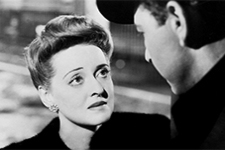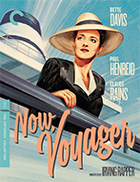Now, Voyager
|  In Now, Voyager, Bette Davis plays a woman who transforms. Of course, virtually all dramas are about transformation of some sort—character arcs are about growth and change, after all, and characters in stories matter primarily because they don’t end the way they began (and, if they do, then that is the very bleak point). But, the transformation of Davis’s character, Charlotte Vale, is so immense, so broad in virtually every way that it becomes more than just a character arc and more of a profound statement about the nature of identity and how it can be both oppressed and liberated. Based on a novel by Olive Higgins Prouty, the poet and novelist who also wrote the source novel for Stella Dallas (made three times, but best known as the 1937 Barbara Stanwyck version), Now, Voyager was a model of the “woman’s picture” that was so popular during the 1940s and into the 1950s, a genre of studio film that allowed female characters and their hopes, dreams, desires, and challenges to take center stage. When we first meet Charlotte, she is a repressed, mousy young woman who lives entirely under the thumb of her domineering matriarch of a mother (Gladys Cooper). Charlotte’s mother, whose immense wealth only emboldens her worst instincts toward control and cruelty, keeps Charlotte, who was born late in her life and is therefore treated differently than her siblings, in a state of perpetual childhood and servitude. Charlotte’s sympathetic sister-in-law Lisa (Ilka Chase) recognizes that Charlotte is being pushed into neurosis by her mother, and she calls in Dr. Jaquith (Claude Rains), a wise and caring psychotherapist who brings her to his sanitarium for a rest cure (the positive depiction of psychotherapy as a means toward better mental health was quite revolutionary in both Prouty’s 1941 novel and in the film). Under Dr. Jaquith’s care and away from her tyrannical mother, Charlotte comes alive in a way she hadn’t before, transforming into the voyager of the title, which is drawn from Walt Whitman’s two-line poem “The Untold Want”: “The untold want by life and land ne’er granted, / Now, voyager, sail thou forth, to seek and find.” Charlotte literally becomes a voyager when she goes on a cruise to Rio de Janeiro following her stay at the sanitarium, where she meets the handsome Jerry Durrance (Paul Henreid), with whom she immediately connects. Jerry is much like Charlotte in that he is under the thumb of someone—not his mother, but rather his unseen wife, who controls and manipulates him. Jerry, who is clearly miserable in his marriage, refuses to leave her out of commitment to their adolescent daughter, Tina (Janis Wilson), who is equally miserable. Although Charlotte and Jerry are clearly in love, the dictates of the plot (and the strictures of the Production Code) ensure that they agree never to see each other again after their time together in Rio, but that is ultimately not to be. When the newly emboldened Charlotte finally stands up to her fearsome mother, the result can only be death, which sends the guilt-ridden daughter back to Dr. Jaquith’s sanitarium, when she happens to cross paths with Tina, whose misery at being unloved by her mother immediately endears her to Charlotte. Charlotte takes Tina under her wing at the sanitarium, essentially becoming the mother Tina never had and allowing herself to express the kind of maternal affection and care that she never knew as a daughter. Getting to this point requires a number of plot contrivances that veteran screenwriter Casey Robinson (Captain Blood) handles in matter-of-fact fashion, but the emotional resonance of Charlotte and Tina’s surrogate mother-daughter connection is so strong that such contrivances are easy to forgive. What is less easy to forgive, however, is the way the film handles the initial stage of Charlotte’s transformation from awkward, repressed spinster to upright woman of her own conviction. Perhaps because Bette Davis had long since cemented herself as a major movie star, director Irving Rapper and the film’s make-up department went overboard in ensuring that Davis’s physical appearance is as off-putting as possible in the film’s opening scenes. With bad posture, thick glasses, fuzzy caterpillar eyebrows, a matronly bun, and a perpetually pursued mouth, Charlotte looks not only repressed, but decades older than she actually is. The make-up and wardrobe smother Davis’s Oscar-nominated performance, turning her into a caricature, rather than a character laboring under submission and emotional abuse. We can see a much better model of how this material could be handled in William Wyler’s The Heiress (1949), for which Olivia de Havilland won her second Oscar playing Catherine Sloper, a shy wallflower who eventually blossoms and becomes her own woman. Catherine’s transformation is decidedly more ambiguous in its nature than Charlotte’s, as The Heiress is a much trickier and more complex film than Now, Voyager. Yet, it isn’t hard to see how Wyler allowed de Havilland to convey her character’s awkwardness and repression via her performance, while Rapper doesn’t trust that we will get it unless Charlotte is as visually ungainly as she is emotionally. This is not to say anything about Bette Davis, whose unconventional beauty and acting prowess made her one of the most formidable and memorable of golden era Hollywood stars; if anything, the choices in make-up and costume take over, forcing her to overact in competition. Once she is able to shed all of that and emerge as a character with the self-confidence to pursue her desires and put them to good use, Davis shines like the very stars she so famously reminds Jerry they already have at the end.
Copyright © 2019 James Kendrick Thoughts? E-mail James Kendrick All images copyright © The Criterion Collection | |||||||||||||||||||||||||||||||
Overall Rating: 

 (3)
(3)


